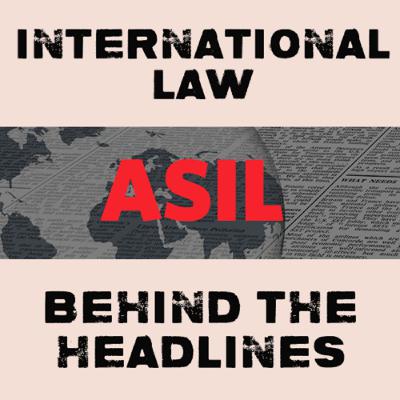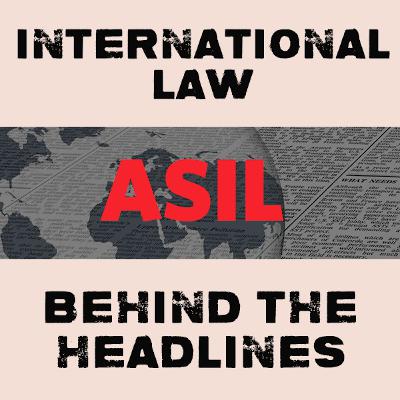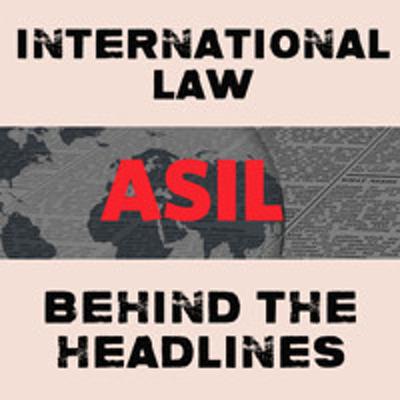Discover International Law Behind the Headlines
International Law Behind the Headlines

International Law Behind the Headlines
Author: American Society of International Law
Subscribed: 305Played: 2,663Subscribe
Share
© All rights reserved
Description
ASIL is a nonprofit, nonpartisan, educational membership organization founded in 1906 and chartered by Congress in 1950. ASIL holds Special Consultative Status to the Economic and Social Council of the United Nations and is a constituent society of the American Council of Learned Societies. The Society is headquartered at Tillar House in Washington, DC.
60 Episodes
Reverse
Boarding and Seizing Ships (and related Caribbean issues) with Michael Scharf, President of the American Branch of the International Law Association
Former Assistant Secretary-General for Legal Affairs Larry Johnson joins the podcast to explain the legal underpinnings of this year’s controversy at the UN General Assembly over visas and visa restrictions for diplomats from Palestine and Iran.
In the past year, three international courts and tribunals—the International Court of Justice (ICJ), the International Tribunal for the Law of the Sea (ITLOS), and the Inter-American Court of Human Rights (IACHR)—have issued advisory opinions on the obligations of countries with respect to climate change. In the context of the ongoing UN General Assembly in NYC, this episode features a conversation between Catherine Amirfar and Payam Akhavan, who have served as counsel to multiple countries in those proceedings, to discuss the opinions, their impact, and next steps, especially for climate vulnerable countries.
In this episode with speak with Katerina Linos of UC Berkeley and Mark Pollack of Temple University about their project to interview the judges of the EU’s primary court system, and the implications for European integration, international law, and our understanding of how international judges behave.
What does the law of treaties—and jus ad bellum—say about peace treaties? We discuss these issues, the history of peace treaties, and their possible future with Greg Fox, who has written widely on peace agreements and their evolution.
On this episode Samantha Rowe, partner in the London office of Debevoise and Plimpton, joins the podcast to discuss the recent Trump executive order aimed at jumpstarting deep seabed mining, the role of the International Seabed Authority, and evolving custom in the law of the sea.
This episode considers the implications of a second Trump administration for international law and policy in the United States and explores the future of the World Trade Organization (WTO). Catherine speaks with Amy Porges, a long-time practitioner of international trade law who participated in drafting the WTO agreements, and later represented the United States before the WTO as Senior Counsel for Dispute Settlement and head of enforcement at the Office of the U.S. Trade Representative. This episode examines the history of the WTO and the United States’s relationship with the organization, including considering the potential approach of the Trump administration to tariffs.
Richard Gowan, Director for UN and Multilateral Diplomacy at the International Crisis Group and one of the world’s chief UN watchers, joins the podcast to discuss what to expect with the new Trump team in Turtle Bay.
In this episode, Catherine is joined by Sean D. Murphy, Manatt/Ahn Professor of International Law at George Washington University and former Member of the UN International Law Commission, where he served as Special Rapporteur on the topic of Crimes against Humanity. Together, they discuss the UN General Assembly’s recent resolution to proceed with negotiations towards a Convention on Prevention and Punishment of Crimes against Humanity, the history of the topic, and what can be expected as negotiations proceed.
In this first of a multi-part series exploring the implications a second Trump administration for international law and policy in the United States, Catherine is joined by Steve Hill, the Executive Secretary of the Institute for International Justice and Rule of Law and former Director of the Office of Legal Affairs at NATO headquarters. This episode explores the history of NATO, its current challenges in light of Russia’s war in Ukraine, and the future of this historic political and military alliance.
In this episode, featuring Professor Leila Sadat, we discuss the recent rise in violent extraterritorial action by states, such as the allegations by Canada that Indian agents killed a Sikh separatist leader in Canada, and the legal framework governing such action and possible reactions.
Peter Singer is Senior Fellow at New America, author of Wired for War and LikeWar, and one of the nation’s leading experts on the evolution of armed conflict. We discuss the revolutions underway in drone warfare, AI, and robotics and their implications for international law.
In this episode, Professor Monica Hakimi of Columbia discusses the international law governing sieges, how it interacts with IHL generally, and its application to the conflict in Gaza.
Reports from the Seventy-seventh World Health Assembly indicate a willingness from member States to finalize the Pandemic Treaty – a proposed legal framework that endeavors to coordinate the global response to future pandemics – within the next year. In this episode, WHO Principal Legal Officer Steven Solomon and WHO Senior Legal Officer Kenneth Piercy join us to pull back the curtain on the treaty negotiations so far and, with an eye to the future, discuss what a concluded Treaty could mean for global pandemic preparedness.
A month after this year’s International Women’s Day and as we approach the eighty-eighth session of the Committee on the Elimination of Discrimination against Women (the “CEDAW Committee”), we must ask: where do we collectively stand in light of the ongoing and new threats to the rights of girls and women around the world, and what comes next? Join us as Professor Rangita de Silva de Alwis of the University of Pennsylvania Law School and Harvard Kennedy School of Government, explores the current time of “great promise and great peril” for the rights of women and girls and the role of the CEDAW Committee in shaping the future of gender equality.
The 28th United Nations Climate Change Conference (“COP28”) concluded on December 13, 2023—with almost 200 countries signing a landmark Stocktake agreement and wide agreement to transition away from fossil fuels. Many commentators have heralded COP28 as a success. Was it, and what comes next for meaningful climate action in the lead-up to COP29? Join us in conversation with Dr. Christina Voigt, Professor of Law at the University of Oslo and Co-Chair of the Paris Agreement Implementation and Compliance Committee, as we look back at COP28, look ahead to COP29, and assess opportunities for effective action to address climate change and its impacts.
From new launches, private and public, into outer space to the growing challenge of “space debris,” space is a growing challenge for international lawyers. We discuss some of the current and emerging issues with Ina Popova, partner in the international dispute resolution group at Debevoise and Plimpton.
Just Security Editors in Chief Tess Bridgeman and Ryan Goodman join Kal to discuss some of the hardest legal questions raised by the current conflict in Israel and Gaza. Topics include civilian-combatant distinctions; human shields; the law of siege and occupation; and the targeting of hospitals and other special facilities.
In this episode, we speak with the first chief prosecutor of the International Criminal Court to discuss the recent actions of the ICC against Vladimir Putin.
In this episode, Catherine Amirfar interviews co-host Kal Raustiala about his new book, The Absolutely Indispensable Man: Ralph Bunche, the United Nations, and the Fight to End Empire.










